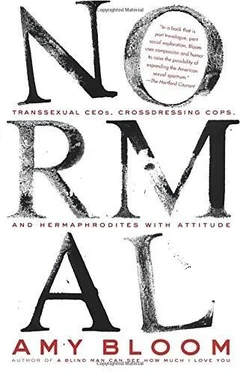Lyle interrupts — the only time I’ll see him openly angry. “Yeah, right. Like I wanted a nose job. Cosmetic. Well, it was only my life.”
Jessie makes soothing hand gestures, reminding him that it’s all right now. “And of course, the money,” she says. “Our other kids resented it. I understand. But what could I do? What could we do? If your child has a birth defect, you get help. We understood — we understood even when he was little that something wasn’t right. And we knew, when the doctors told us what could be done — we just knew what we had to do. When the doctors said he was transsexual, I felt that I knew that.”
After hearing Lyle’s stories about his hated girl name, his astonished, frightened tears and protracted battles over party dresses, Mary Janes, and even girl-styled polo shirts, and his deep, early sense of male identity — the same stories I would later hear, with minor variations, from almost every transsexual man I spoke with — I ask him about life since the transition. He gives me a glossy friend-filled account highlighted by a two-year romance with an older woman (twenty, to his seventeen) and a successful football career cut short by an ankle injury.
And after high school?
Finally, a bit of trouble: “I had a little money problem and a little drug problem. I got some counseling, came back from Las Vegas, started college. Now I’m taking classes, paying off my bills, working for the state. Eventually, I’ll get my bachelor’s.”
He sighs, and Jessie says quickly, “That’s all right. Lots of older kids are in college these days. Aren’t they?” I say I know quite a few, and we sip our iced tea.
“I did a lot of partying, some wild times,” Lyle continues. “I think maybe I was frustrated. Maybe I did drugs partly because I was so frustrated at not being able to get my bottom surgery right away. Maybe. I just felt not quite right, but the surgery didn’t make the difference I thought it would. It just made me feel me — not macho, just me. Uh, sexually.” He looks at his mother. “It helped me out mentally, not really physically. But it cost so much. Not that Don Laub wasn’t fair — he was. And when it was over, all I wanted to say was, ‘Thank you, Dr. Laub, for letting me be reborn.’ But if it hadn’t been for that I’d have a very nice house by now.”
He laughs and Jessie laughs. “Me too,” she says. “We’d have two very nice houses.” Not looking at him, she goes on. “There is another surgery he could have, to get all the feeling”—a surgery in which a nerve taken from the forearm is run through the phallus—“but we just don’t have the money.”
I didn’t ask any questions, because at the time I didn’t know much about the different kinds of phalloplasties and I thought that it was rude to ask people about the working condition of their genitals, constructed or otherwise.
Lyle says, “What does it cost? Another forty grand? To have more sensation? It’d be nice, I guess, but I’d rather pay off my debts and buy a condo. What I have is fine. I need to get back on my feet financially and own my home more than I need to—” He laughs again and looks at his mother, who laughs too.
“And anyway,” Jessie says, “he wouldn’t ever let us see it, even after we nursed him following the surgery.”
“Did you want to?” I ask.
Lyle is laughing and shaking his head no.
“Well, yes,” Jessie says, slightly injured. “He’s my son. I wanted to know.”
“No, Mom. I’m twenty-eight. I maintain the boundaries here,” Lyle says to me, and his mother smiles, a little puzzled and hurt that this is the thing he won’t share.
“I’m pretty darn happy now. I want to finish school, and when I’m ready I’d like to marry, have a family. I’m not ready yet for a serious relationship. Psychologically, I’m just getting ready to date again.”
He sounds like a lot of the young men in AA or NA, a little ashamed, a little proud of his hell-raising days, understanding that it’s time to grow up, and a little sorry that’s so.
We take a break, and Lyle shows me the photographs I’ve asked to see. It seems absurd to describe the child I’m looking at as a little girl; even in a ruffled blouse, this is a little boy: a sturdy little boy looking adoringly at his dad while happily playing with his electric train, and then a cocky kid in cowboy hat and boots, and then a handsome, shaggy graduating senior being kissed by a pretty girl, and then Lyle as he is now, a friendly, beefy man with thinning blond hair — exactly the look of many West Coast high school football stars ten years down the road.
James Green, a transsexual man who has organized a get-together for me at his Oakland condo, sits beside me in the rental car while I look for the dimmer switch. I’m parked in his parking space, since he has chivalrously moved his car a block away to make room for me. I find the headlights, I find the interior light. I find the wipers. I cannot turn off the brights. James reaches across me with his left hand and adjusts the dimmer switch. The brights go down, and he looks at me exactly as other men have on such occasions: affectionate, pleased, a little charmed by this blind spot of mine. We smile at each other and I shrug. He shrugs too. “It’s innate,” he says, and he laughs, not taking his eyes off me.
We are dining unfashionably early, in an austerely hip neighborhood café, before the other men arrive at James’s place. A huge plate of food is put before James, and he hunches over slightly and begins eating. I notice that he does not say, “Gee, this is a lot of food,” or anything of the kind. Like a man, he just starts eating. I ask him how he met the girlfriend he’d mentioned earlier.
James puts his fork down and gives me the full effect of his green eyes. “She’s a writer. She was interviewing me.” A quick unfolding of a Jack Nicholson smile, and then, with slow mock-shyness, he goes back to his dinner. I smile too.
After dinner, we drive to his condo, which is clearly the home of a writer and a noncustodial father: eclectic reference books spill off the bookshelves, the refrigerator door is bedecked with drawings by and photographs of a cute little girl, dolls and coloring books make a pink-and-purple jumble in a corner of the living room. When James was a lesbian, the woman he lived with had a child, whom he regards as his daughter; after his surgery, they broke up, but he now sees the little girl as much as he can.
The doorbell rings, and James introduces me to Loren and Luis, guys from the local transsexual community.
Loren Cameron, a blond bantamweight photographer, is wearing a billowing tank top and black shorts. He has a tight, perfect build, and startling black stripes tattooed across his chest, on both forearms, and on his thighs. A cross between Mercury and Rob Lowe, he looks like a not uncommon type of handsome, hairless, possibly gay man one sees on beaches and boardwalks.
Loren has been romantically involved with a massage therapist named Elizabeth for the last six years. When I speak to her later, I’m not surprised to learn that she is a former dancer and a fitness fanatic, and to find out for myself that she is marvelously, mellowly narcissistic.
“Well, Loren and I are a striking-looking couple,” Elizabeth says. “We’re both very fit, and I know that people look at us when we walk down the street. After all, I’m about four inches taller than he is.” Elizabeth describes her two previous lovers: a beautiful Amazon and an unusually sensitive man. “But with Loren, he can communicate, for the most part, like a woman, and he makes love like a man. When I met him, he was a very attractive woman. Now he’s an even more attractive man. And that’s that.”
Читать дальше












